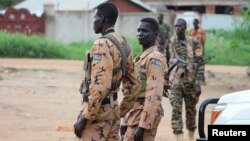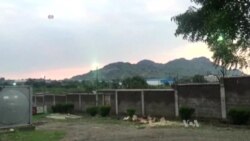South Sudan's rival leaders have called on their forces to halt fighting which threatens to tear apart a fragile peace agreement and unity government.
Speaking to a local radio station Monday, First Vice President and former rebel leader Riek Machar urged his forces to honor a cease-fire declared hours earlier by President Salva Kiir.
"I am informing all the troops that have been fighting, defending themselves, to respect this cease-fire and to remain where they are now," Machar told independent Eye Radio.
Kiir's "declaration of cessation of hostilities," issued Monday, ordered both sides to stop fighting at 6 p.m. local time in Juba. It directed commanders to control their forces, protect civilian life and property and safeguard any ethnic group that may be targeted by soldiers under their command.
Later, government officials ordered army troops to return to barracks immediately.
Fighting raged across Juba for a fifth day Monday, hours after the United Nations Security Council called on leaders in South Sudan to control their rival forces, and warned that ongoing attacks on civilians and U.N. facilities may constitute war crimes.
Thousands of frightened civilians have crowded into U.N. bases to escape the clashes between pro-Kiir and pro-Machar forces that erupted on Thursday, and a witness told VOA Monday that Kiir forces had shelled a U.N. protection of civilians site.
Local radio in the capital earlier reported as many as 276 dead in several days of violence, while a spokesman for Machar said at least 150 were killed with scores of others wounded.
In Washington, the State Department welcomed the call for a cease-fire.
"Today, we welcome the presidential decree declaring a unilateral cease-fire to take effect at 6 o'clock," said State Department Spokesman John Kirby on Monday, urging leaders of both sides to "do everything in their power to ensure these decrees will be fully respected, and unfettered humanitarian assistance will be provided."
Meanwhile, the U.S. Embassy in Juba has reduced the number of staff in response to the deterioration in the security situation. But the ordered departure of non-emergency personnel is not an evacuation.
Samantha Power, the U.S. ambassador to the U.N., said the attacks in South Sudan are "deplorable" and that the "targeting of what are meant to be inviolable U.N. premises is totally outrageous and unacceptable and goes beyond even the savagery that we've seen over the life of this conflict."
Akshaya Kumar of Human Rights Watch said, "For too long, the U.N. Security Council has relied on the goodwill of South Sudan's leaders, neglected accountability and brandished empty threats of an arms embargo and individual sanctions." Kumar said that was a "losing strategy" that has "obviously failed."
"The council should make clear that attacks against civilians will not be tolerated and that U.N. peacekeepers will use the full force of their mandate and military capabilities to protect civilians under their care," said Kumar."It should also finally impose an arms embargo, which could immediately ground the South Sudanese attack helicopters that are operated by foreign crews and constrain the ability of armed forces to target civilians going forward."
WATCH: Fighting Mars S. Sudan Independence Anniversary
Ambassador Koro Bessho also urged Kiir and Machar to "genuinely commit themselves to the full and immediate implementation of the [2015] peace agreement" that ended a devastating two-year civil war in the impoverished country.
The war erupted in December 2013, a few months after Kiir fired Machar as South Sudan's vice president.
Machar has since been reinstated as part of the peace deal, reached last August, which also led to the formation of a transitional unity government.
Neither leader, however, has yet offered a workable plan to integrate their forces.
The latest fighting in Africa's newest nation was the first major outbreak of violence since Machar was reappointed vice president in April.
The World Food Program says 4.8 million South Sudanese are facing severe food shortages this year, with parts of the impoverished country on the brink of famine. It also says fighting has driven 2.4 million residents from their homes, while hundreds of thousands of others have fled the country as refugees.
With the country's fragile economy in shambles, monitors predict as many as 1 million South Sudanese will have fled the country by the end of the year.








